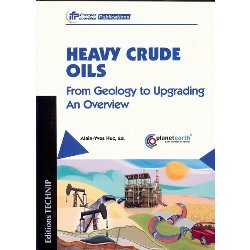
Heavy Crude Oils: From Geology to Upgrading – An overview
Heavy Crude Oils is a comprehensive review of all aspects of heavy crudes. Part 1 deals with definitions, composition and geological origins. A brief review of the key terms, such as ‘heavy’, ‘extra-heavy’, ‘bitumen’, ‘tar sand’ and ‘oil sand’ (the book uses “heavy crudes” for all of them), is followed by a section on the statistical importance of the world’s heavy crude resource.
Part 2, the biggest section, details the reservoir habitat and the production methods commonly used to exploit heavy crudes. Oil sand mining is used for completely immobile crudes, where the reservoir is excavated wholesale and the separated sand returned to the ground after processing. Crudes which are to some degree mobile can be produced either “cold” or by heat-treating them.
Part 3 examines the transport of heavy crudes, and the various methods of reducing viscosity. These include heat treatment (I was surprised to learn that it is possible for heat treatment to worsen the rheological properties of crudes), dilution with solvent, aqueous emulsions, and techniques still in the experimental phase, such as core annular flow. Part 4 looks at upgrading of heavy crudes, focusing on the lowering sulphur and metal contents. The processes of de-asphalting, visbreaking, coking and hydrotreating are described, and their relative merits and de-merits examined. Much of this section was new to me, but it is very clearly written and all the terms and various acronyms are fully explained.
Part 5 tackles the environmental issues that arise out of the very nature of heavy crude production, such as the problems of sand treatment and disposal in bitumen mining; the large amounts of water necessary to generate steam for steam soaking; and the amounts of CO2 produced by steam generation and by some of the upgrading processes. Part 6 looks at the ongoing technical challenges associated with major heavy oil projects. This section also contains useful summary figures for the costs involved, and a cost comparison with conventional crude production.
The book is very clearly written (written in French, it has been Englished by a native speaker) and would usefully serve any company that is interested in investing in heavy crude exploration and production. Given the amount of untapped heavy crude out there, more and more companies will no doubt be investigating that possibility in the not too distant future. This book is a very good place to start.
Reviewed by: Pete Webb, Petrus Consulting, High Peak, Derbyshire
HEAVY CRUDE OILS: FROM GEOLOGY TO UPGRADING – AN OVERVIEW Alain-Yves Huc (ed.) Published by: Editions Technip Publication date: 2010 ISBN: 978-2-7108-0890-9. 439pp. List price: $US115.00; €100.00 www.editionstechnip.com